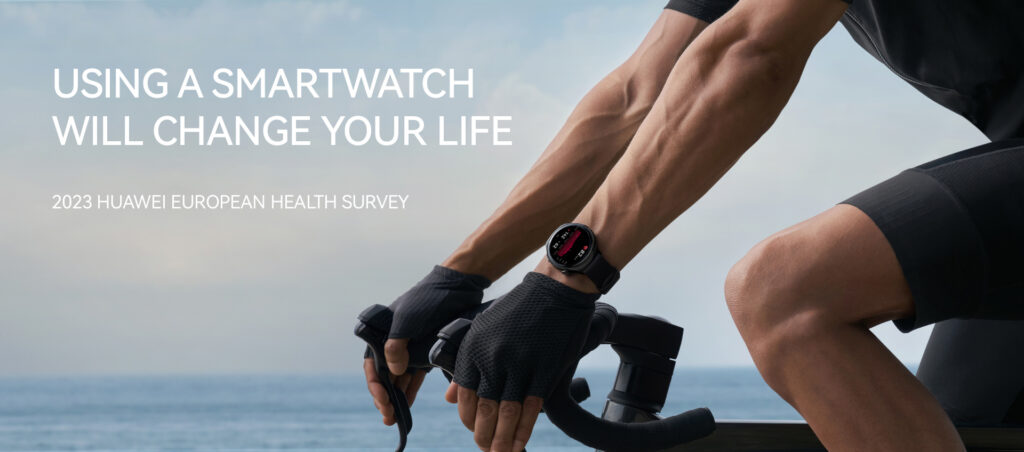Pan European survey commissioned by Huawei exploring health awareness, attitudes and behaviours reveals limited knowledge of consumers of what constitutes good health, and highlights the untapped potential of smart health technologies.
– Only 50% of European citizens claim they are satisfied with their physical fitness; 91% of respondents want to improve at least one aspect of health-related lifestyle
– Most smartwatch users (88%) claim their device can help improve their physical health; 87% have introduced at least one new healthy habit as a result of data served to them
– Mental health is top of mind, with sleep and stress cited as top two concerns; but awareness of important health indicators is very limited
– Over half (54%) of Europeans do not have regular medical examinations; 63% of smartwatch users have visited their doctor after getting an abnormal health reading from their device
LONDON, UK, 29 November 2023 – The 2023 HUAWEI European Health Survey, published today, offers valuable insight into the attitudes and behaviours of European citizens concerning personal health. The research, conducted by Ipsos, uncovers the unrealised potential benefits of smartwatches across the region at a time when preventative care and democratisation of health information is more critical than ever.
“Mental and physical health is top of the agenda for individuals and broader society,” observes William Tian, President of Europe, Huawei Consumer Business Group.
“We set out to discover if European citizens were actively prioritising their personal health and if they recognised the key health metrics crucial to their overall well-being. Additionally, we sought to understand whether smartwatch users exhibited greater health awareness and healthier habits compared to non-users. Our research revealed some unsettling realities while unequivocally demonstrating the transformative influence of a health-focused smartwatch.”
A summary of some of the key findings of the report:
I CAN’T GET NO (HEALTH) SATISFACTION
European interest in personal health is high, with equal focus on psychological well-being and physical health among respondents (>83% vs. >82%). However, overall health satisfaction remains moderate, with only half of the survey participants reported being content with their general health. Concerns regarding physical fitness (24%), mobility (26%), reduced energy levels (29%), and a significant proportion being medically overweight or obese (46%) were highlighted. In conclusion, the appetite and need for significant health improvement is clear.
GOOD INTENTIONS…DISAPPOINTING OUTCOMES
91% of people asked expressed a desire to enhance at least one aspect of their health-related lifestyle, aiming to improve an average of nearly four (3.9) healthy habits each. Stress reduction was the top priority for many (43% of respondents), followed by maintaining the correct weight (40%), eating healthily (35%), ensuring adequate sleep (35%), and daily exercise (34%). Despite these aspirations, 72% of European citizens acknowledged requiring additional motivation or often losing motivation in adhering to healthy lifestyle habits.
KNOWLEDGE GAP HAMPERS PROGRESS
Reported knowledge about important health indicators is very limited (with most cited metrics by respondents not being real health measures at all, but rather activities such as ‘drinking more water’). Awareness of what the correct ‘scores’ for certain vital health metrics ought to be for each individual was also very low. This reveals a fundamental knowledge gap regarding metrics that significantly impact health. However, regular access to personalised health indicators directly influences a deeper understanding of advanced health – smartwatch users in Europe are on average 51% more likely to know the target measurements for all key health metrics than non-users.
MULTIPLE METRICS, MICRO-HABITS, MOMENTOUS CHANGES
Consistent tracking of multiple health metrics helps develop powerful micro-habits and behaviour change – and the research data shows the impact smartwatches can have here:
On average, smartwatch users in Europe are 51% more likely to be aware of accurate target measurements for all essential health metrics compared to non-users. Additionally, they exhibit a 75% higher likelihood of knowing their target body fat measurement and a 71% higher likelihood of being aware of their correct daily calorie target.
Smartwatch users check their core health metrics over twice as often as non-users. Specifically, they monitor their heart rate, blood oxygenation saturation, and calories burned nearly three times more frequently than individuals without a device (2.8x, 2.7x, and 2.6x, respectively). Among daily tracked measures, physical activity, measured by steps, is predominant, with nearly half of all users monitoring their steps daily—an important contributor to improved health.
Smartwatch users take health notifications seriously, with over 74% seeking advice when their device alerts them to abnormal health indicators, leading 63% to visit their doctor for further analysis.
Moreover, an impressive 87% of smartwatch users adopted new healthy behaviors based on their device’s information, averaging two changes per user. These changes include increased exercise frequency (47%), longer exercise duration (41%), improved sleep habits (39%), and dietary adjustments (28%).
Emphatically, smartwatch users credit their device with overwhelming positive outcomes, with 88% of users agreeing that their device can help improve their physical health; 86% their overall quality of life; and 76% their mental health.
ADVANCED METRICS READILY AVAILABLE DUE TO INVESTMENT IN THREE HUAWEI HEALTH LABS
Huawei has spent a decade developing a world-leading wearable technology portfolio across hardware, software and services. A relentless commitment to research and innovation in health and fitness technology has enabled Huawei to develop incredibly sophisticated and accurate intelligent sensing for the entire body.
Acknowledging the growing need in the health and fitness market, Huawei is committed to deeper research in health monitoring algorithms through its wearable technologies. This led to the establishment of three Health Labs across the globe since 2016 in Xi’an and Songshan Lakes in China, and this year in Helsinki, Finland. The Finland Health Lab is staffed with a multidisciplinary scientific research team comprising of 6 PhD’s and 20 Experts from 5 major fields – physiology, AI, machine learning, software testing, and software engineering – across 7 EU countries. This assures that every area of sports and health research reaches the world’s advanced standards.
FOR FULL BREAKDOWN OF DATA BY COUNTRY VISIT THE OFFICIAL WEBSITE AND DOWNLOAD THE FULL REPORT

